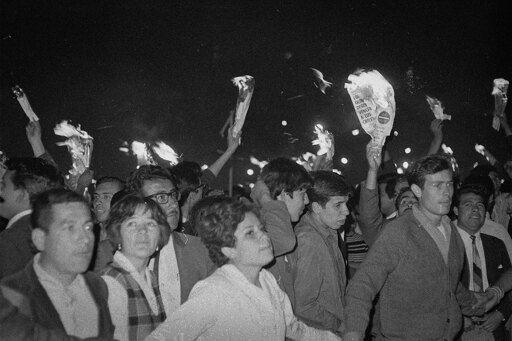This editorial by Jaime Ornelas Delgado originally appeared in the October 2, 2025 edition of La Jornada de Oriente, the Puebla edition of Mexico’s premier left wing daily newspaper.
It’s certainly worth remembering that in Mexico, in 1968, there was a massive social movement that marked the beginning of the country’s change of direction. At that time, there was a growing certainty that history was not, and could not continue to be, an inevitable imposition, but that it could be influenced and its direction changed, taking the future into our own hands to shape and build it with everyone, as the collective dream dictated.
The movement emerged in a society that enjoyed high rates of economic growth; however, the so-called “Mexican miracle” did not improve the well-being of the population. Income distribution shifted then, as it does today, as always under capitalism, in favor of a small segment of the population, while poverty became widespread. This project was accompanied by a political regime that had become worn out and whose government was increasingly distancing itself from the interests of the population.
A long repressive aftermath had characterized the exercise of power in Mexico. Democracy was a mere gesture, its practitioners mere gesticulators, while the democratic sectors, Communists, and other socialist forces, operated in unwanted illegality, fighting to open spaces for democracy, which often cost them their freedom or their lives.

In that anti-democratic, stifling, and absolutely repressive environment, youth were searching for a direction to follow. Particularly in the universities, they were looking for a future different from that offered by those in power. The single-minded approach—which at that time was expressed by identifying the government as the representative of the nation’s interests , such that confronting the government was confronting the nation, which legitimized repression—was a way of life. This, of course, ceased to appeal to young people who knew that a different world was possible. They saw it in the Vietnamese defending their nation against imperialist invasion; they saw it in the guerrilla struggles of Latin America, led by Che Guevara; finally, they saw it in the struggles led by Demetrio Vallejo and Valentín Campa for proletarian emancipation, who, from prison, continued to encourage the struggle of the communists and all the democratic forces in the country.
 Valentín Campa
Valentín Campa
In this environment of economic expansion and modernization, under a politically repressive and closed regime, young people became aware that they could take their lives—the present and the future—into their own hands. They wanted decisions about how they should live to be made by no one but themselves. This was not an individualistic vision, but one that blended the individual and the collective, defending the right of individuals, but also of society, to decide for themselves what they wanted their society to be like.
Whether one likes it or not, the 1968 movement would mark a milestone in the country’s political and cultural history. It was the first tragic expression of a new social presence and a warning that, from then on, mobilized citizens would demand much more from the government than economic growth and political stability. They would also demand participation, democratization, pluralism, respect for the law, and the rejection of authoritarian, monolithic, single-party presidentialism.
The movement demonstrated the citizens’ desire to dismantle the foundations of the abusive and patrimonial presidential regime: impunity, corruption, politics turned into a monopoly of government bureaucracy, the state party, and the persecution and repression of dissent.
The response to the Gustavo Díaz Ordaz government’s move was insane and abusive. Disproportionate repression was swift. On Wednesday, October 2, around 10,000 people gathered in the Plaza of the Three Cultures in Tlatelolco and were massacred by the “forces of law and order.” That day, October 2, the hope for a better, just, and democratic country was crushed. There is no explanation for the reasons for ordering the massacre . Reason cannot be found, and only in the rationality of the loss of authoritarian power could any explanation for the unjustifiable be found.
Mexico needs a social movement that will drive political victory over the same forces that on October 2 brought about the painful end of the popular student movement.
Dr. Jaime Ornelas Delgado is an economist, with a Bachelor’s degree in Economics, and Master’s degree and Doctorate in Urban Planning from UNAM.
People’s Mañanera October 2
October 2, 2025
President Sheinbaum’s daily press conference, with comments on remembering October 2 1968, President’s first annual report, gas transport safety, action against fuel theft, and amparo reform.
October 2nd: Never Again!
October 2, 2025
The ’68 movement marked a milestone in Mexico’s political & cultural history: the first tragic expression of a new social presence and a warning that mobilized citizens would demand much more than economic growth & political stability.
Mexico-People’s Republic of China Friendship Group Established in Chamber of Deputies
October 2, 2025
The group aims to strengthen ties of friendship and cooperation between the two nations in the political, economic, cultural, and social spheres.
The post October 2nd: Never Again! appeared first on Mexico Solidarity Media.
From Mexico Solidarity Media via this RSS feed





